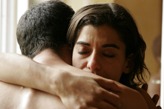
Film Festivals | Massachusetts
A New Generation of Jewish Film Programming
Written by Jared M. Gordon | Posted by: erin
The Boston Jewish Film Festival (BJFF), held from November 5-16, celebrates its 20th year with over 60 screenings and 35 panelists in nine locations. This year, under the guidance of new artistic director, Noa Rembiszewski, the festival embarks upon an ambitious program with the overarching theme of viewpoints from Generation X.
According to executive director Sara L. Rubin, “The festival was a special project, grown out from Michal Goldman’s nonprofit Filmmakers’ Collaborative. It filled a need for filmmakers who might not identify with mainstream Judaism but still identified with being Jewish, and would allow them to explore it through film.” Goldman founded the festival in 1989 and remained on the festival board until 2007, when she resigned to work on her own projects (At Home in Utopia, Jumpin’ Night in the Garden of Eden).
Rembiszewski began at the BJFF in May. A graduate (and department production supervisor) of Israel’s Sapir College of Film and Television, festival organizers became acquainted with her through last year’s festival tribute to the college. In addition to her production background, Rembiszewski also worked with Israeli director Eytan Fox (Yossi and Jagger, Walk on Water). Rubin commented on Rembiszewski’s appointment: “[Rembiszewski] has a fine sensibility in appraising a film’s quality. She’s done a great job of balancing documentaries, features, experimental films, and short films.”
Those looking for a fresh look at Jewish themes will not be disappointed. This year features a lineup particularly tailored to Generation X (those born between approximately 1965-1977). “It’s a younger, different perspective,” she says Rembiszewski. “I’m very interested in movies that not only entertain but also make a difference. I’m looking for movies that influence an audience to listen, learn, and find a new way to look at ourselves. These movies have a lot of responsibility; they’re ambassadors of the Jewish world. This is how I see my position.”
Films such as Guy Nattiv and Erez Tadmor’s Strangers and Cyril Gelblat’s Cycles neatly tie together this festival’s principle of viewing established themes through the lens of a new generation. Rubin says, “Younger filmmakers are dealing with many of the same topics as older filmmakers. They’re looking at the Palestinian conflict, the world Jewish community, what it’s like in Israel, the Holocaust, and they’re presenting overall different insights. Strangers, as an example, has a pacing that’s definitely reflective of Generation X, growing up in a tech-saturated environment.”
The subject matter of several films in this year’s lineup also reflects generational chasms and conflicts between old and new. Rembiszewski says, “These younger directors touch the same subjects that have been touched on for years, but with different perspectives. We have one documentary, Amir Har-Gil’s Good Morning Israel, that discusses living in Israel, having a father who is a Holocaust survivor, and exploring the option of leaving Israel. Twenty to thirty years ago, you would’ve been thought of as a traitor if you wanted to leave, but now it’s more and more common.”
The BJFF’s lineup also offers several ties to New England. Brett Rapkin and Erik Kesten’s Holy Land Hardball follows the journey of Boston native Larry Baras and his quest to begin Israel’s first professional baseball league. Producer Matt Levine from Newton produced Andrew Jacobs’s Four Seasons Lodge, a documentary about a Catskill retreat for Holocaust survivors. Other films with local ties include Jake Boritt’s Budapest to Gettysburg and Alan Rosenthal’s Waves of Freedom. Budapest details director Boritt’s father’s survival through the Holocaust to become one of America’s foremost authorities on Abraham Lincoln and the Civil War, and Waves documents American recruits and their struggle to break the British naval blockade of Palestine in 1947.
As for the future of the BJFF, Rembiszewski says, “I’m interested in adding more interactive programs and more workshops. I’d like to invite more guest directors and producers to make it more interactive for the audience.” Thematically, Rubin says, “We’ll be searching for those themes that make sense and reflect what’s happening in the world.”
For more information, festival lineup, and schedules, please visit www.bjff.org.
For more information, festival lineup, and schedules, please visit www.bjff.org.









